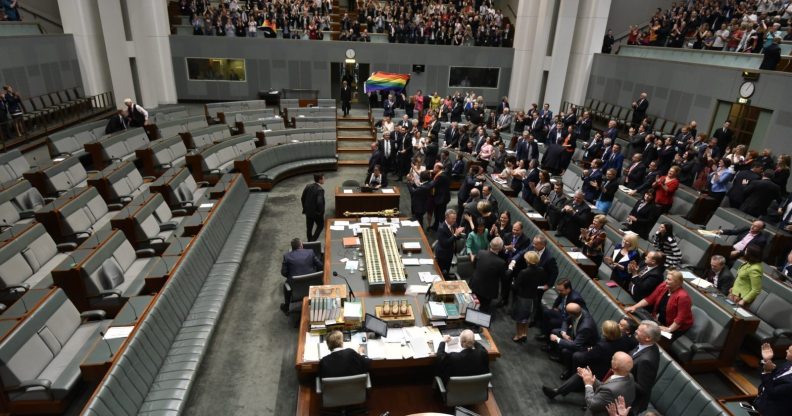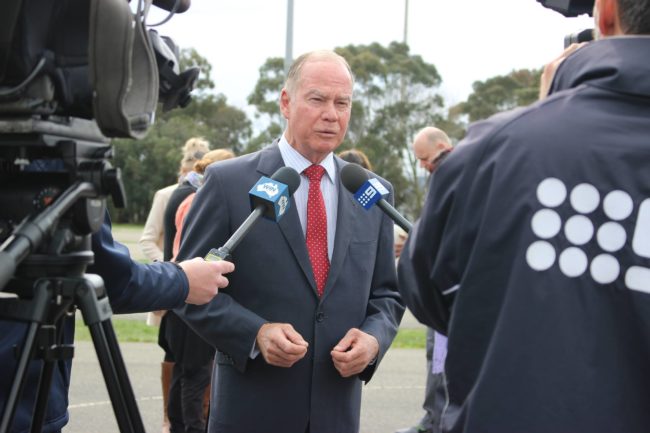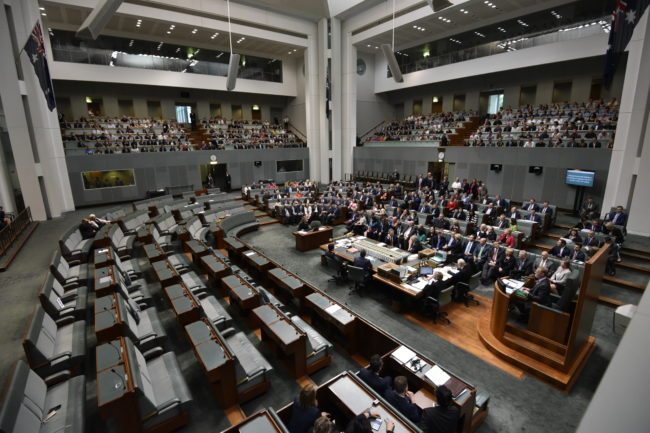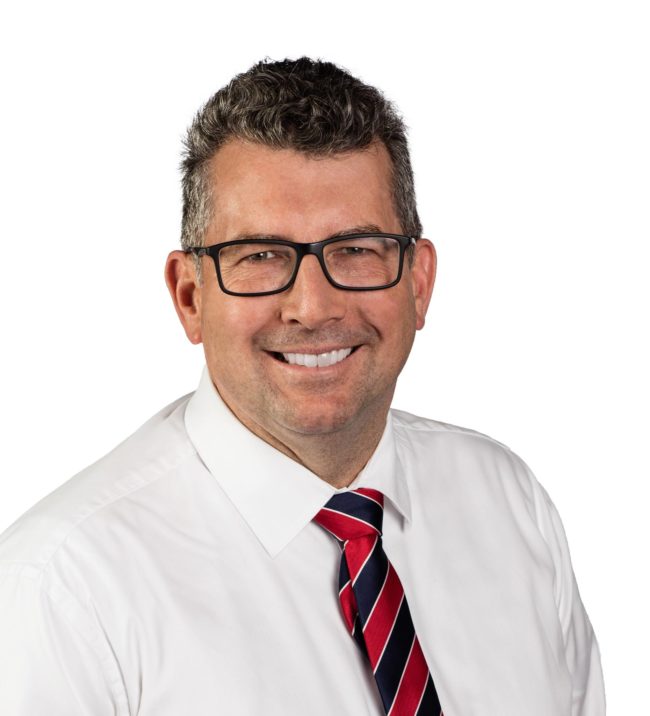Two Australian MPs defied their own constituents to vote against same-sex marriage

CANBERRA, AUSTRALIA – DECEMBER 07: Members of Parliament celebrate at Parliament House on December 7, 2017 in Canberra, Australia. The historic bill was passed on the voices and no count was made due to the overwhelming support for the bill on the final day of sitting for 2017. The legislation means same-sex couples will now be able to be legally married in Australia. Australians voted ‘Yes’ in the Marriage Law Postal Survey for the law to be changed in November. (Photo by Michael Masters/Getty Images)
Two Australian MPs ignored the will of their own constituents and the nation at large to vote against same-sex marriage.
The Australian Parliament gave approval to same-sex marriage this week, with a bill passing the House of Representatives with a resounding majority after a public ballot showed overwhelming support.
Of the 150 members of the House, just four actively voted against the bill, while a handful of others abstained.
Two of the MPs who voted against the measure – Keith Pitt and Russell Broadbent – did so despite the fact that a majority of their own constituents voted in favour in the public postal ballot.

Russell Broadbent MP
Mr Broadbent was elected to represent the people of McMillan where 62.7 percent of people supported equality.
But he opted to ignore the public and vote in line with his own personal beliefs.
He said: “My position on this has been well known. I note the very strong vote for same-sex marriage, but I dare say if you ever put a proposition to an Australian about equality, you’re on a hiding to nothing because it’s in our DNA.
“But I have a long-held position on this issue… I voted No in the survey.
“I will not be obstructionist, I understand and respect the will of the Australian people, but at the same time I have a long held standing position on this, and everyone knows where I stand.”
Asked if he was disrespecting his constituents, he said: “I don’t believe I am, because I represent [people who voted no] as well. I don’t just represent the 62 percent.”

(Photo by Michael Masters/Getty Images)
Mr Pitt represents Hinkler, where the public narrowly voted in favour of equal marriage, with 50.7% support.
The politician chose to ignore them, but said his vote against same-sex marriage was actually against the bill’s lack of protections for people who wish to discriminate against LGBT people on religious grounds.
He said: “I think it’s critical that the 4 million Australians who did vote ‘no’ not only are represented in this place, but have their views protected in this bill.
“So my final decision to support or otherwise this bill will not be a reflection of the survey results or a reflection of those who’ve successfully lobbied for a change to the Marriage Act, because the change will take place.

“It will be simply a reflection on the bill which is before the House and a view as to whether it does or does not adequately address the concerns of many in my electorate.
“I’m one of those in this place who believe you should have the courage of your convictions.”
The other two MPs who voted No were Bob Katter and David Littleproud.
Mr Littleproud said he was reflecting the will of his constituency, one of the few areas where No won a majority, while Mr Katter is a notorious opponent of LGBT rights and made a homophobic speech on the floor this week.
Mr Katter’s constituents also opposed same-sex marriage.
The country’s former Prime Minister Tony Abbott abstained on the bill, despite the overwhelming support for marriage equality in his constituency.
Abbott was one of the most vocal opponents of same-sex marriage during the campaign.
During the campaign the ex-leader encouraged people to vote No because “children should have both a mother and a father”, lashing out at “transgender marriage” and “radical gay sex education”.
But the politician, who just weeks ago told anti-LGBT lobbyists that their movement “should continue” beyond the vote, appears to be singing to a different songbook after voters decisively backed equal marriage.
In a speech in Parliament, Abbott said he now believes equal marriage will “strengthen our social fabric” of Australia – just weeks after insisting it would “strain the social fabric” and undermine the traditional family.
Yes campaigners have celebrated the victory.
The Equality Campaign said: “This Bill ensures every LGBTI Australian will now be treated equally with the same dignity and respect as their fellow Australians and will be able to marry the person they love.
“We would like to thank the tens of thousands of Australians who tirelessly volunteered across the nation. We achieved this because of you. Today is your day.
“To the many LGBTI Australians who have gone before us – thank you. The YES Campaign salutes you and we are eternally grateful for the path you paved, the path that enables us to be here today. Today is in your honour.
“To every young LGBTI Australian across the nation, today ensures there will never be a question about whether you can have the same dreams, aspirations and opportunities as your brothers, sisters and friends.
“For those who have waited months, years or decades to finally have the chance to marry, it’s now your time.
“This has been a tough road for LGBTI Australians, their families and friends. However, achieving marriage equality today enables us to move forward stronger and more resilient, knowing that no Australian has to ever live through this experience again.
“We thank the millions of Australians who voted YES and we want to assure every Australian who didn’t that marriage equality will take from no-one and simply make our nation a kinder, fairer and more inclusive place to live.
“Today we celebrate that finally the law recognises what we always knew: our lives and relationships have the same value and worth. We are equal.
“We did this together, be proud.”
The Equality Campaign added: “The House of Representatives voted to make all couples equal in Australia.
“No words can do true justice to how momentous, meaningful and powerful this achievement is. For the couple who have been waiting 50 years to propose, for the young person growing up in a small town figuring out who they are — today is a huge day.
“The relationships of LGBTI Australians can finally be seen as they are: equally loving, committed, meaningful and worthy of recognition and celebration.
“Together we have achieved something historic by bringing people together. From those who marched in the first Mardi Gras in 1978, to those who marched for YES this year — united we continue to advance the cause of a decades-long struggle for fairness and equality for all.”

